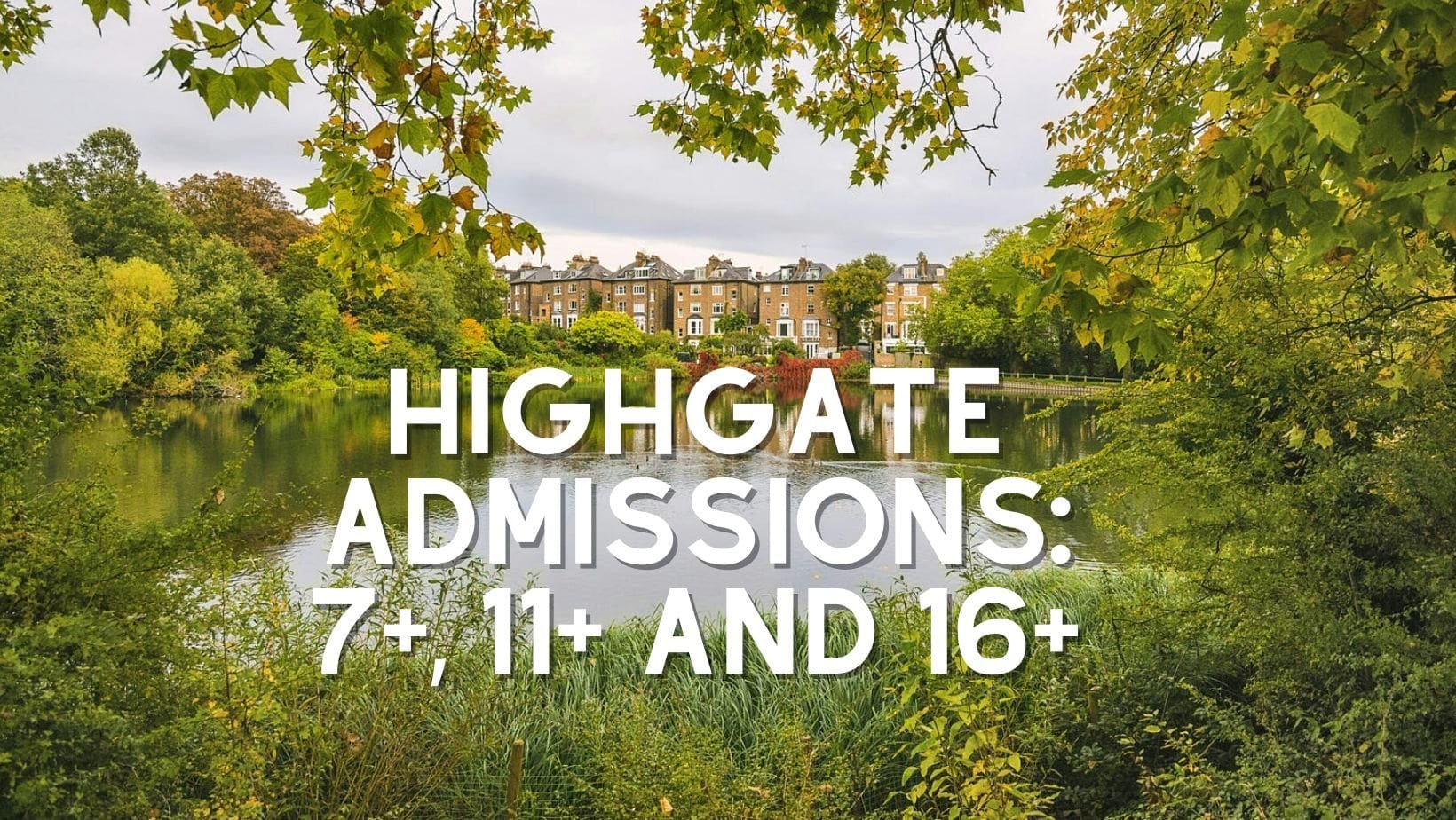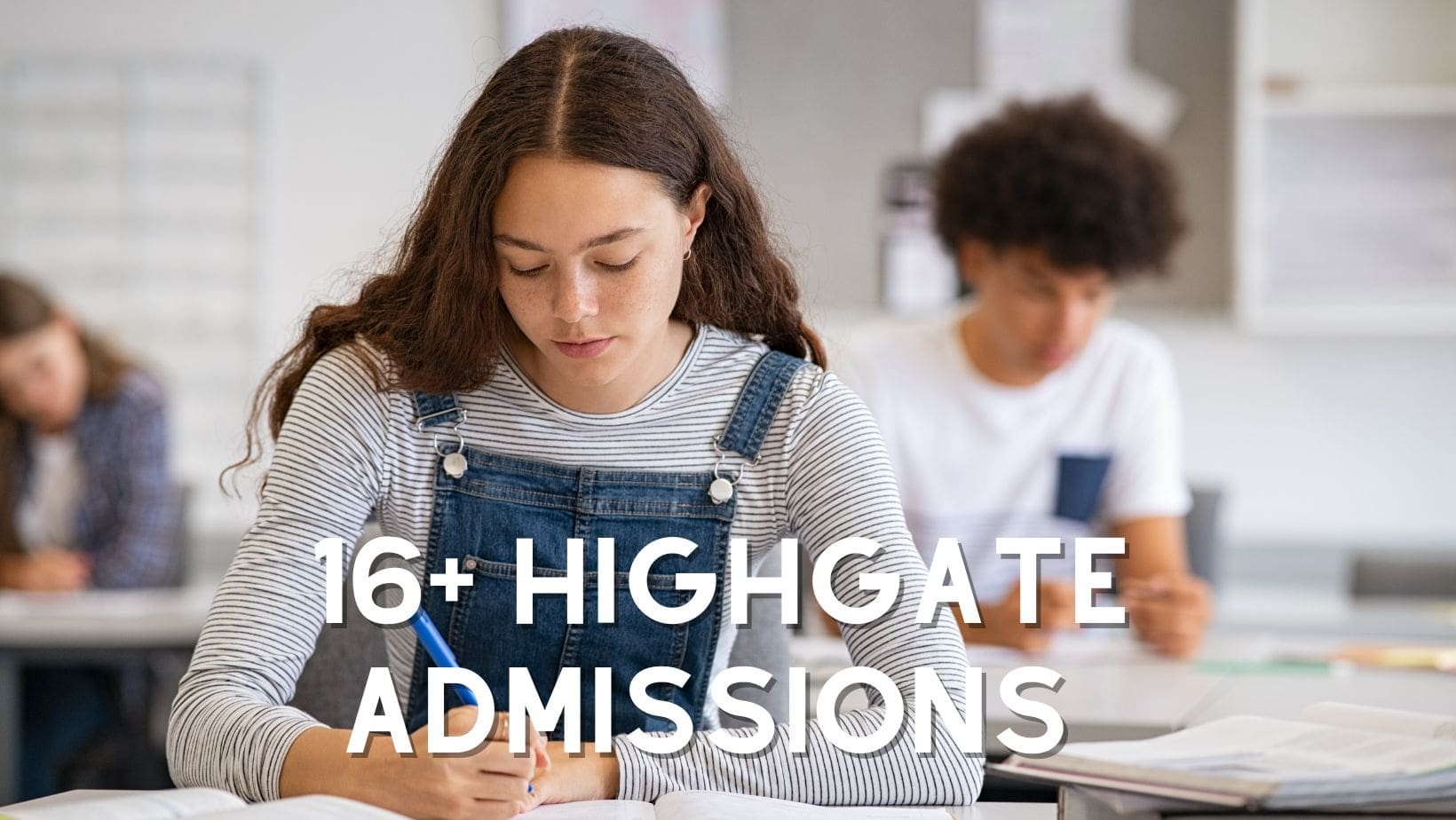Your Ultimate Guide to Highgate School Admissions: How to Succeed
Highgate Admissions: An Introduction
Highgate school is one of the top co-educational schools in England, located in North London, by Hampstead Heath. Founded in 1595, Highgate is a historic school which places a strong emphasis on cultivating curiosity and a love of learning for its own sake, as well as fostering a welcoming and open-minded community where all pupils feel like they belong, no matter their background. In 2021, it was awarded London Independent School of the Decade and its students consistently receive top results at GCSE and A Level, as well as offers for further study at top UK and global institutions.
Highgate School is really divided into three schools:
The Pre-Preparatory School: for pupils in Reception, Years 1 and 2, with around 180 pupils and one major entry point at 4+
The Junior School: for pupils in Years 3-6, with around 440 pupils and one major entry point at 7+.
The Senior School: for pupils in Years 7-13, with around 1,330 pupils and two major entry points at 11+ and 16+.
At all of these levels, Highgate places a strong emphasis on co-curricular learning with time set aside each week for students to get involved in at least one co-curricular club or society. In the pre-prep school, students have forest school sessions and one trip outside the classroom each term to support learning. At the Junior School, co-curricular activities range from skate boarding to gardening to brass band. At the Senior School, opportunities widen considerably with a choice of over 100 clubs and societies, including exciting options like Aquarium Builders, Ceramics and Sign Language, alongside more traditional activities like CCF.
This guide to Highgate admissions will break down the admissions process and criteria at 7+, 11+ and 16+, as well as offering insight into excelling in the interviews and entrance exams at each level.
Highgate 7+ Admissions
At the Highgate 7+ entry point, the school welcomes 50 new pupils to join Year 3 of their Junior School, alongside 60 of Highgate’s Pre-Prep pupils.
In order to join Highgate 7+, applicants should register their interest in the school to keep up-to-date with key info about the Highgate 7+ admissions process, such as open days and the deadline to submit their application.
All Highgate 7+ applicants will sit two entrance exams, one in English and one in Maths. Note that there is no verbal or non-verbal reasoning paper for Highgate 7+. Pupils who perform well in these entrance exams are invited to an activity and interview day where they will attend a taster lesson and group interviews. Offers are then sent out in late January, after which future pupils attend an induction afternoon where they see the school again and meet their new classmates and teacher.
Highgate 7+ Tips
In the English exam, students are given 5 minutes to read a short text. This text is not from a work of pre-existing literature but written each year by the school’s head of English. They will then have to answer a set of reading comprehension questions based on VIPERS (vocabulary, inference, prediction, explanation, retrieval, summarising). These questions are a mix of multiple choice and written responses. For the final section of the exam, students are asked to complete a piece of creative writing based on the story.
It’s important all 7+ applicants work on boosting their vocabulary from as early as possible to ensure they can understand the text and comprehension questions testing their understanding of meaning, as well as to allow them to use original and creative descriptive language in their writing piece.
For further advice on the Highgate 7+ English exam, take a look at our Guide to Mastering 7+ Exams. You may also like to view the Highgate 7+ Sample Paper for English here.
In the Maths exam, candidates for Highgate 7+ need to be confident in core mathematical topics of KS1 and early KS2, including addition, subtraction, multiplication, division, fractions, decimals, measurements, geometry, and basic algebraic concepts. The Highgate 7+ Maths paper tests these skills and pushes students with some multi-step questions where showing their working is important! You can view the sample paper for Highgate 7+ Maths here.
For more 7+ maths tips, take a look at our guide.
For the Highgate 7+ activity and assessment day, it’s important that, at this young age, students are able to demonstrate advanced listening and teamwork skills, as well as critical thinking skills. In group activities, candidates need to find a balance between offering their own ideas and demonstrating their problem-solving skills, and making sure they actively listen to others in the group and are able to work well as a team. You can build up these skills at home with family or friends: choose an object for discussion, such as a picture or souvenir, and encourage your child to think critically about it and offer their ideas. Remind them that it is important to be interested and listen attentively to the ideas of everyone else in the group, and to put their hand up before they speak.
You can find out more about the 7+ tuition services we offer here, or get in touch to book a free initial consultation and find out how we can support your child in their Highgate 7+ application.
Highgate Admissions: 11+
At 11+ Highgate Admissions, around 80 pupils join the school. This is a great point to make the most of steady, targeted preparation to achieve strong academic results, with students going on to receive outstanding GCSE results (in 2024, 94% of all GCSE results were graded at 7, 8 or 9).
To join Highgate in Year 7, students should register their interest in the school to find out about key information like open day times and registration deadlines and submit their application in line with this. Applicants will then sit entrance exams at the school in English, Maths and Non-Verbal Reasoning.
The English paper tests students on their comprehension and analysis skills (30 minutes), alongside a creative writing exercise (15 minutes). Candidates must use descriptive language and try and be as creative as possible with their language choices, employing similes/metaphors and unique imagery. Remember there are a final 5 marks awarded for spelling, punctuation and grammar so it’s important they leave time to check.
We have devoted guides to 11+ reading comprehension and 11+ creative writing, filled with insightful tips and preparation advice to help you excel. If you’d like to learn more about how we can support students at 11+, take a look at our 11+ page or get in touch to arrange an initial consultation to discuss your needs.
The Maths paper for 11+ Highgate admissions tests core KS2 Maths topics. It is broken up into sections which students must wait to be told to turn over. They should make sure they attempt all the questions for each section, moving on if they find one question too hard rather than getting stuck and missing the whole page!
Here we have uploaded a Highgate Maths Sample Paper and Answers.
For Non-Verbal reasoning, Highgate has created a video tutorial to introduce the paper to students. You can watch it here.
Students who are successful in the entrance exams will be invited back for a group interview and taster lesson in January. This is an opportunity for candidates to demonstrate their knowledge, problem-solving skills and ability to listen effectively and work as part of a team. For more tips to allow your child to stand out in the interview, see our 11+ interview guide here, or take a look at our bank of 11+ questions to give you lots of opportunities to practise with them.
Offers are then sent out in early February. After this, future pupils will be invited to an informal welcome event at Highgate in June.
If you’d like support with Highgate 11+ admissions, take a look at our 11+ page to see the range of ways we can support you from one-to-one tailored tuition to group summer courses to boost 11+ English and Maths skills. You can also get in touch to book a free initial consultation to discuss your needs.
Highgate Sixth Form Admissions
Joining Highgate Sixth Form is a great opportunity to make the most of what the school offers and to be pushed academically throughout the A Level programme. Highgate offers a great variety of A Levels from Ancient History to Computer Science to Russian and students study four A Level subjects in Year 12, with the option to drop down to three in Year 13. They also have access to great Sixth Form facilities, including a common room with social spaces and coffee bars and a study space in the library dedicated for sixth formers.
Around 30 new boys and girls join Highgate Sixth Form each year, joining the 185 Highgate pupils moving into Year 12. The Sixth Form has a strong record of academic success (78% of Highgate sixth formers were awarded an A or A* at A Level in 2024) and a record of sending pupils to great institutions for further study: in 2024, 22 pupils received places at Oxbridge, 12 pupils received places at international universities and another 12 went on to study Medicine or Veterinary Medicine.
To earn a place for yourself or your child at Highgate Sixth form, it’s important to register your interest so you receive all information about admissions deadlines and open days. Visiting Highgate Sixth Form and the rest of the school at an open day in September is also a great way to understand the school, meet staff and ask questions to find out whether it is the right fit. Applicants must then submit their application by mid-October and pay the £150 application fee.
There are no written assessments or personal statement required for Highgate Sixth Form admissions. Instead, all applicants must attend interviews in person at the school in November. They will have an interview in each of the subjects they are looking to study at A Level, as well as a more general interview with a senior member of staff.
Offers are sent out at the end of November but places are not confirmed until students receive their GCSE results. Students must achieve 8s or 9s at GCSE in the four subjects they wish to study at A Level, and an additional four 7s or equivalent in order to secure their place. Offer holders are invited to an informal reception in early December to give them the opportunity to meet staff, sixth forms and other prospective students.
Tips to Stand Out in Highgate Sixth Form Admissions:
Show a love of learning
Highgate places a strong emphasis on creating a love of learning and a lifelong curiosity in its pupils throughout the school. In order to join Highgate Sixth Form, students need to show their interviewers that they are passionate about the subjects they wish to study at A Level and have gone above and beyond to learn more about them. As Highgate makes sure to devote time in the school week for co-curricular activities, applicants should look for ways to get involved in co-curricular learning through after school clubs and activities. They may be interested in the online co-curricular clubs we run on our beyond the curriculum platform, Minds Underground, ranging from World Literature to STEM to Debate. Find out more about these here. They should make sure to research the co-curricular activities on offer at Highgate Sixth Form and talk about their interest in these to show their enthusiasm for getting stuck into the school community.
Expect the unexpected
It’s important students are confident in the subjects they are looking to study at A Level as they will have lots of time to talk about these in the Highgate Sixth Form Interview. They must make sure they know their syllabus well but are also prepared for unfamiliar material! The interview will be designed to push and challenge students on their knowledge of their subjects, as well as their ability to apply this knowledge to new topics. They should be confident on what they’ve studied but also capable of going beyond. A great way to build this confidence is through further reading and independent exploration (see below!)
Read lots and read critically
By reading widely about their A Level subject choices and with a critical eye, students can build a bigger picture of their subject and understand different areas and theoretical approaches. Reading isn’t an exercise in memorising everything that may come up in the Highgate Sixth Form interview, but an opportunity for students to practise applying their knowledge in new ways and build skills to be more prepared to interpret new information they may encounter in the interview, drawing interesting parallels with things they have studied or read!
If you’d like further advice on standing out in Highgate Sixth Form admissions and securing a place, take a look at our 16+ Interview guide and question bank, designed to provide students with essential tips and opportunities to practice common 16+ questions so they go into the interview feeling prepared. They may also prefer to work with a tutor specialising in Highgate Sixth Form admissions who can help improve their confidence in the interview and ensure they come across as naturally enthusiastic and intelligent, rather than overly rehearsed. Find out more about ways we can support.
How U2 Tuition Can Support with Highgate Admissions
At U2 Tuition, we provide comprehensive support for Highgate admissions, tailored to your child's needs. Our expert tutors specialise in 7+, 11+, and 16+ entry, offering bespoke guidance across all stages of the process:
Entrance Exam Preparation: Targeted tutoring for English, Maths and Non Verbal Reasoning to build skills for 7+ and 11+ exams.
Interview Preparation: Mock interviews and tailored feedback to help your child communicate effectively and showcase their unique strengths and enthusiasm for learning.
Co-Curricular Guidance: Advice and support to align your child's interests and achievements with Highgate's holistic ethos. We offer a range of co-curricular activities via our co-curricular learning platform, Minds Underground.
We’re here to help your child stand out in Highgate’s competitive admissions process. Get in touch today to discuss how we can support your family.








